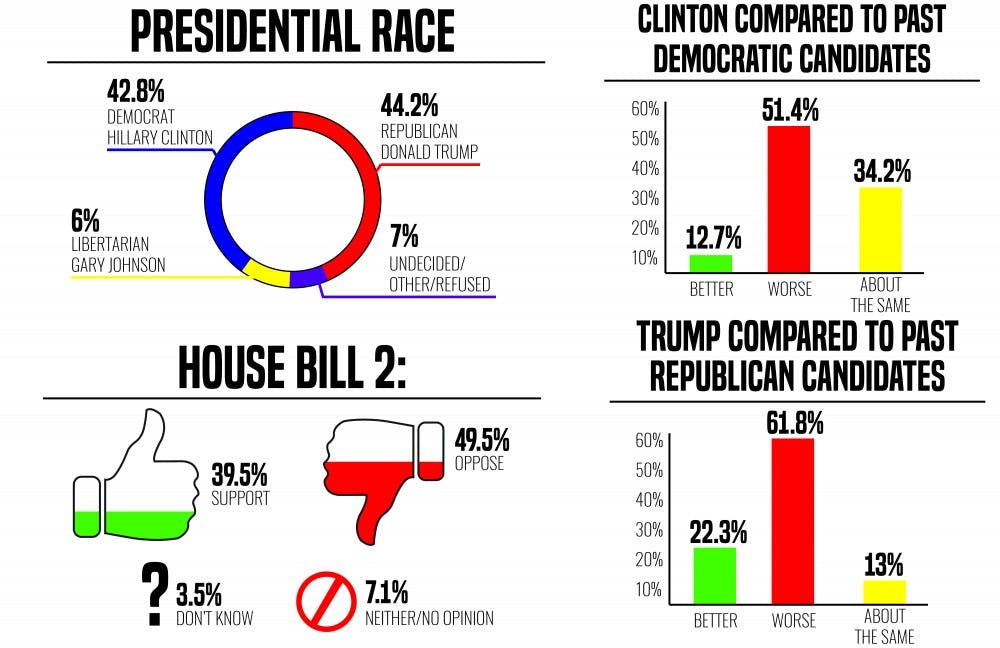Elon University Poll results released Monday and Tuesday show tight presidential, gubernatorial and senatorial races in North Carolina. Differences between first- and second-place finishers fell within the 3.86 percent margin of error.
Republican presidential nominee Donald Trump captured a narrow victory over Democrat Hillary Clinton — Trump earned 44.2 percent of the vote, while Clinton got 42.8 percent. Libertarian Gary Johnson polled at 6 percent.
Republican incumbent Gov. Pat McCrory finished ahead of Democratic challenger Attorney General Roy Cooper, 48.7 percent to 46 percent. Democratic challenger Deborah Ross captured 44.4 percent of the vote for U.S. Senate, ousting Republican incumbent Sen. Richard Burr by 1 percent.
Though the results show no clear winner, Elon Poll director Jason Husser said they reflect continuing divisiveness within the state.
“Everything is too close to call,” Husser said. “What we’ll probably see over the next couple months are polls bouncing back and forth within two or three points.”
The poll also asked likely voters for their stances on a range of issues, including House Bill 2, a bill passed by the state legislature in March that, among many things, requires people to use restrooms that correspond to the sex on their birth certificates. Of 644 likely voters surveyed, 95.4 percent of respondents said they heard of HB2.
Among those who said they heard of HB2, 49.5 percent oppose the bill, while 39.5 percent support it. Regardless of their personal feelings, 59.9 percent of respondents said North Carolina’s reputation is worse since HB2 was passed. How McCrory handled HB2 made 36.2 percent of voters less likely to vote for him, while 34.6 percent said it made no difference.

North Carolina's gubernatorial and senatorial races are tightly contested. A majority of likely voters said the state's reputation is worse since House Bill 2 was passed. Graphic by Stephanie Hays, design chief.
Husser said the NCAA’s decision last week to remove tournament games from North Carolina could have contributed to increased opposition. Even so, he explained the effects are largely unchanged.
“Most of the effects of HB2 have already been felt in the race,” Husser said. “If there’s a repeal or modification of HB2, it can shake things up in ways we couldn’t predict.”
Elon Poll’s full report noted HB2, “received a mixed response” and, “is a difficult issue for the McCrory coalition.”
The poll added that McCrory’s lead, “could be higher if a more popular issue like Connect NC infrastructure funding was the central campaign narrative instead of a divisive issue like HB2.”
Issues related to HB2 and major candidates took a prominent role in the Elon Poll but were not the only important questions asked to likely North Carolina voters.
The majority of respondents expressed frustration with the two major presidential candidates — 61.8 percent said Trump is a worse Republican candidate than usual, while 51.4 percent said Clinton is a worse Democratic candidate than usual.
Though the prospects of Clinton becoming the first female president may be appealing to some, 87.3 percent of likely voters surveyed said the opportunity to elect the first female president in U.S. history does not make much difference in how likely they are to vote on her behalf.
Respondents said Trump would do better with three demographics — rich people, men and whites — whereas Clinton would do better with poor people, middle-class people, women, African-Americans and Hispanics or Latinos.
One of the more interesting questions in the poll was whether U.S. President Barack Obama or Russian President Vladimir Putin was a better leader of his respective country. A three-fifths majority swung in Obama’s favor, but the results were pretty mixed along party lines.
Democrats voted in favor of Obama, 94 percent to 4 percent. Republicans favored Putin, 39 percent to 29 percent. One-third of Republicans either refused to answer or didn’t know whom to choose. Obama’s overall approval rating was 46.2 percent.


